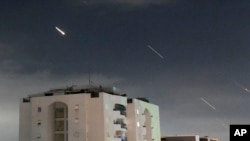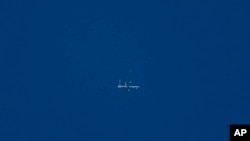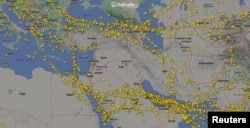The Group of Seven leading industrial countries, or G7, met Sunday and “unequivocally” condemned Iran’s overnight attack on Israel.
"We express our full solidarity and support to Israel and its people and reaffirm our commitment towards its security," the leaders said after a video meeting in a statement published by the Italian G7 presidency.
Israel said Sunday that Iran launched 320 warheads against it in “an unprecedented attack,” but that its air defenses along with those of the United States and other supportive countries shot down 99% of them.
“With its actions, Iran has further stepped toward the destabilization of the region and risks provoking an uncontrollable regional escalation,” the G7 statement said. “This must be avoided.”
Lt. Col. Peter Lerner, an Israel Defense Forces spokesperson, told CNN, “They [Iran] failed in their attack.”
The Sunday G7 session was called by Italy, which holds the rotating presidency of the group. Its members include Britain, Canada, France, Germany, Japan and the United States.
Lerner said Tehran targeted a military base that Iran said was used to launch the April 1 attack on the Iranian consulate in the Syrian capital of Damascus that killed two Iranian generals. He said the overnight airstrike “didn’t cause much damage.”
The IDF spokesperson said Iran launched 170 explosive drones against Israel, 120 ballistic missiles and 30 cruise missiles, with most of them coming directly from Iranian territory although some were fired by Iranian militant proxies based in Iraq and Yemen.
White House national security spokesperson John Kirby told CNN that the “vast majority” of the warheads were launched from Iran. “There was no way to do what they did without violating international air space,” sending them over other countries in the region as it targeted Israel.
A few of the projectiles landed in Israel but most were shot down before they reached Israeli airspace.
Officials said one young Arab-Israeli girl was critically injured when hit by shrapnel, the only reported casualty.
The United Nations Security Council was meeting Sunday afternoon, with Israel and Iran expected to address the council. Israel requested the meeting.
Kirby called the defense of Israel from the Iranian attacks “an incredible military achievement.” He said there was “not very much” damage in Israel.
Iran warned Israel and the United States on Sunday of a much larger response if Israel attempts to retaliate for the attacks on its territory.
Iran said it had ended its assault on Israel, but Lerner said, “We don’t necessarily take their word,” adding that “just this morning,” Iran-backed Hezbollah militants had fired on Israel from Lebanon.
Kirby said that while the U.S. helped knock down incoming Iranian warheads, it has told Israel it “will not participate in an attack on Iran.”
Israeli Prime Minister Benjamin Netanyahu convened his war Cabinet to discuss a response to the Iranian attack.
"We intercepted, we repelled, together we shall win," Netanyahu said on social media.
Israeli Defense Minister Yoav Gallant said, despite thwarting the overnight attack, the military campaign was not over and "we must be prepared for every scenario."
Centrist war Cabinet minister Benny Gantz said Israel will respond to the attack.
"We will build a regional coalition and exact the price from Iran in the fashion and timing that is right for us," Gantz said.
Iran’s top military force, the Islamic Revolutionary Guard Corps, issued a predawn statement Sunday, saying that it launched missiles and drones from Iranian territory toward Israel in retaliation for the attack on its consulate in Damascus. Israel has neither confirmed nor denied responsibility for the April 1 strike, although the U.S. reportedly criticized Israel for not alerting it ahead of time.
The Israel Airports Authority announced early Sunday that as of 7:30 a.m. local time, Israeli airspace had reopened. It said flight schedules at Tel Aviv’s Ben Gurion Airport were subject to change.
Iran urged Israel not to retaliate for the strikes.
"The matter can be deemed concluded," Iran's mission to the United Nations said in a post on social media platform X.
"However, should the Israeli regime make another mistake, Iran's response will be considerably more severe," the mission said.
The aerial attack on Israel from Iranian territory marked a major escalation in the conflict between the rival regional powers and prompted action by U.S. forces in support of Israel.
Video posted on social media late Saturday showed some of the projectiles being intercepted over central and southern Israel and others hitting the ground and exploding as sirens wailed.
In a message sent to VOA, Israeli reserves Brig. Gen. Jacob Nagel, a former national security adviser to Netanyahu, said Israeli forces were assisted by their U.S., British, Jordanian and Saudi allies in intercepting the Iranian projectiles.
A U.S. military official confirmed to VOA that U.S. forces shot down Iranian-launched drones targeting Israel.
U.S. President Joe Biden spoke with Netanyahu late Saturday. The official said Biden’s national security team “will continue to work with partners in the region to prevent further escalation.”
As the Iranian assault began, Netanyahu said in a televised message that Israel would defend itself "against any threat and will do so level-headedly and with determination.”
At around the same time, White House National Security Council spokesperson Adrienne Watson issued a statement saying the United States will "stand with the people of Israel and support their defense against these threats from Iran.”
"This attack is likely to unfold over a number of hours. President Biden has been clear: our support for Israel's security is ironclad,” Watson said.
Netanyahu acknowledged that support in his own statement, saying, "We appreciate the U.S. standing alongside Israel, as well as the support of Britain, France and many other countries.”
VOA’s Michael Lipin, United Nations correspondent Margaret Besheer and national security correspondent Jeff Seldin contributed to this report. Some information came from The Associated Press and Reuters.









